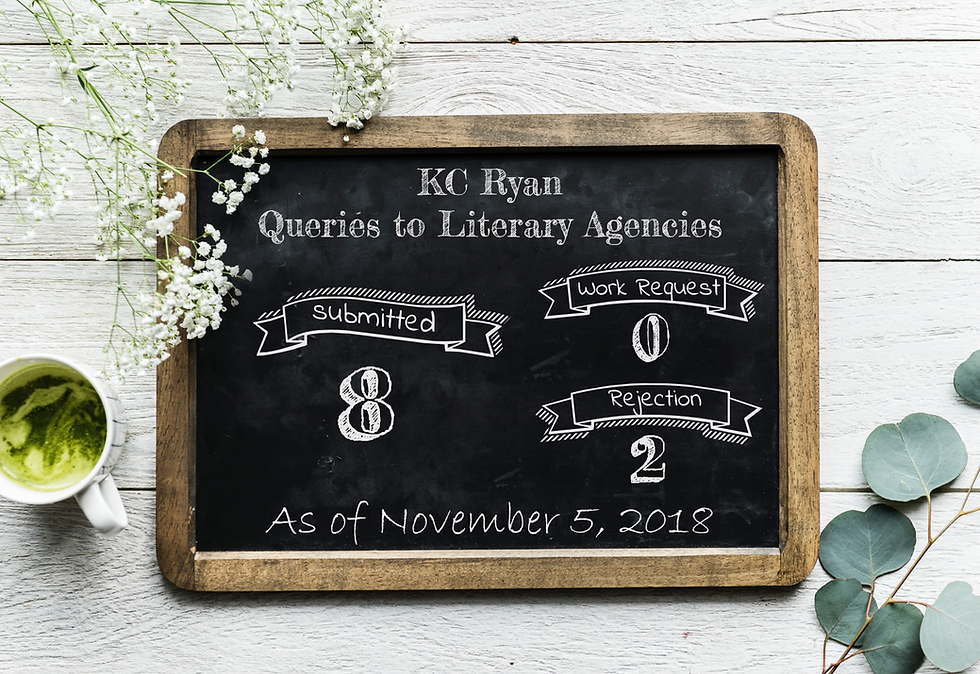An Author in Search of an Agent
- KC Ryan

- Nov 5, 2018
- 3 min read
The first things people ask me when I confess that I’ve written a book are, “Did you publish it?” and “Where can I buy it?” Oh, if it were only that simple.
Unless an author is going the route of self-publishing, the road to getting a book in print is a long one. It’s a process that is more like Lord of the Rings than the plot of a fast-paced thriller. In other words, when you type “The End,” you’ve only just begun the trudge to Mount Doom.
Once the book is written, revised, and edited, it is time to start querying literary agencies. Large publishing houses no longer take unrepresented manuscripts, meaning they won’t look at your book unless it is submitted to them through a literary agent, and getting one of those is easier said than done.
To successfully query an agent, three documents must be composed: a query letter, a synopsis, and a short biography. These three items are as vital as the book itself because initially, they are the only documents most agents want you to send them. The query letter is a business letter that includes a personalized note to the agent, a back-of-the-book style teaser, and a glimpse into who you are. The second document, the synopsis, is especially challenging to most writers because it requires them to take their 300-plus-page manuscript and boil it down into a two-page, colorless description of the main plot. The biography is the simplest, being just a few paragraphs including a more in-depth representation of your background and who you are as a writer. It is of paramount importance that your query letter be well-written and enticing enough to make a person who gets hundreds of queries a week take notice and want to read your synopsis, and then hopefully your entire novel.
Not every agent represents every type of author. Some don’t care for science fiction and fantasy, while others prefer to represent those genres. Some only represent children’s books. To decide on who to query, a writer should research each agent to determine their likes and dislikes, if they are open to queries, and if their personality looks like it could be a good fit teamed with your own. This takes time and energy, but I’ve found a few websites that help.
Manuscript Wish List is a site where agents can go to share their interests and post more details about the kind of works they are hoping to receive. QueryTracker is service that allows you to search for agents in a variety of ways, including by the authors they represent. Both allow you to search by genre.
Searching for representation is time consuming and requires a thick skin. It can take an agent anywhere from 4 to 6 weeks to review your query, at which point you will either get a request for your manuscript, a rejection, or nothing at all (many agencies tell you to look at a non-response as a pass on your work). If you get too many non-responses or rejections on your queries, it is usually a sign that your query letter or synopsis needs to be reworked. Because of this, a writer has to devise a game plan of how to handle submissions. One should not query all available agencies at once because you lose the chance to make your query more appealing before everyone passes on your work. At the same time, you can’t just sit around waiting for rejections before submitting more queries since it can take weeks to hear back.
My goal is to query 4 agents a week and cross all my fingers and toes that one or two of them will want to read my novel. I’ve created a query tracker to keep all my well-wishers in the loop. Send good vibes my way!


![Social[ly] Media [Awkward]](https://static.wixstatic.com/media/1ff7f9_4533bd30338343e59ea6353572c5e073~mv2.png/v1/fill/w_980,h_653,al_c,q_90,usm_0.66_1.00_0.01,enc_avif,quality_auto/1ff7f9_4533bd30338343e59ea6353572c5e073~mv2.png)
Comments